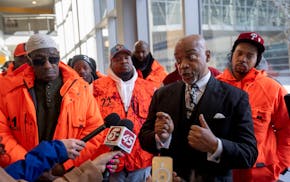Tim Walz is seeing joy everywhere.
There's joy at the Democratic fundraisers, rallies and delegate breakfasts he's attending, stumping on behalf of Vice President Kamala Harris as her running mate. At a recent fundraiser in Boston, the Minnesota governor said Democrats were "always fighting back against something," but the message is different now.
"We're seeing a whole group of young people who've never been involved in the politics of joy, never been involved in the politics of what's possible," he said.
That idea of the "politics of joy" has become an unofficial theme of the three-week-old Harris-Walz campaign for the White House, cropping up in speeches and news headlines as Democrats try to shift the vibe of the 2024 cycle from one of grim resignation to exuberance.
But Walz didn't coin "the politics of joy" — the phrase comes from another prominent Minnesotan, who later regretted using it at a pivotal moment in his political career.
Hubert Humphrey wears Minnesota Vikings coach Bud Grant's hat on Sept. 3, 1971.
"It's a very ironic story," said Samuel Freedman, who wrote "Into the Bright Sunshine," a book about the civil rights fight of a young Hubert Humphrey. The former vice president and Minnesota U.S. senator introduced the "politics of joy" phrase into the lexicon when he jumped into the battle for the Democratic presidential nomination in 1968.
"What we're dealing with now is the rehabilitation and redemption of a phrase that Humphrey on one hand embraced and also regretted," Freedman said.
Humphrey, then vice president, decided to run for the presidential nomination after President Lyndon B. Johnson ended his own bid for reelection. Johnson's poll numbers were dipping and he was facing strong opposition from anti-war candidates.
On April 27, 1968, in front of a crowd of 1,700 supporters at the Shoreham Hotel in Washington, D.C., Humphrey delivered a 20-minute speech that promised to unite the nation.
"And here we are, just as we ought to be, here we are, the people, here we are the spirit of dedication, here we are the way politics ought to be in America," Humphrey told the crowd, and those watching and listening to the television and radio broadcasts of the speech. "The politics of happiness, politics of purpose, politics of joy; and that's the way it's going to be, all the way, too, from here on out."
The comment was met with applause in the room, and a marked-up copy of the speech preserved by the Minnesota Historical Society suggests Humphrey himself either wrote or put emphasis on the idea of the politics of joy in the speech.
In his autobiography, Humphrey would later write that the concept of the politics of joy was "a phrase I did not invent" but that would haunt him. He delivered the speech at a turbulent moment for the country. Martin Luther King had been assassinated weeks earlier, Johnson was freshly out of the presidential race and there was growing frustration about the death toll in the Vietnam War.
"When he used that phrase the politics of joy, it landed like an anvil in the context of all the problems America was going through in 1968," Freedman said. "It was rare for Humphrey, being the great retail politician he was. He had a great intuitive sense of where the public was at, but in this case he just misread the mood."
Humphrey would go on to win the Democratic presidential nomination but was narrowly defeated by Republican Richard Nixon for the presidency.
Freedman said it's fascinating to see the phrase emerge again in a new context. Walz, like Humphrey, is good at retail politics, and his delivery of the line on the campaign trail feels authentic because of his own exuberance, Freedman said.
"Fifty-six years later and a lot of the public is ravenous for the idea that joy can come back into politics," he said. "Now it feels like a tonic to a lot of people."

University of Minnesota is putting its golf course up for sale

St. Paul sees 'unprecedented' day care closures, sending families scrambling

Federal grand jury indicts Minneapolis violence interrupters on felony gun charges

